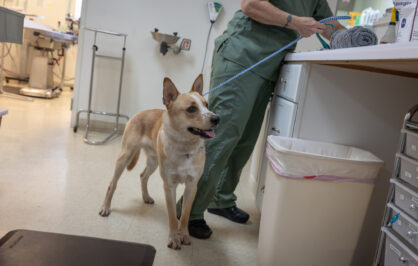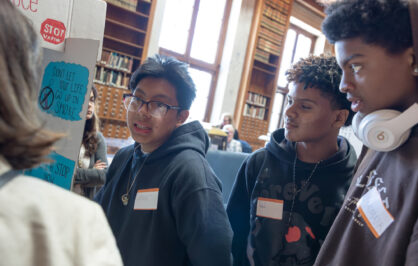
Media release
Animal welfare groups awarded $550,000
These grants are where the generosity of donors and the dedication of animal welfare organizations meet
The Rhode Island Foundation is awarding $550,000 in grants to 24 animal welfare programs across the state. The funding will support a range of services including providing reduced-cost veterinary care for pets of low-income households, preparing animals for adoption and rehabilitating injured wildlife.
“These grants support the care of animals in shelters, underwrite veterinary services and subsidize spay and neuter procedures for pets owned by low-income households, as well as preparing shelter animals for adoption and delivering humane education,” said Adrian Bonéy, program officer for the Foundation’s Program for Animal Welfare (PAW).
PAW funds organizations that promote and provide humane treatment of animals or work more generally on the welfare of animals. Grants are for projects or programs that have a positive impact locally or statewide on animal care, education about the humane treatment of animals, and animal welfare in general.
PAW is comprised of 13 special funds that relate to the humane treatment and protection of animals. These funds collectively enable the Foundation to support the work of animal welfare groups statewide.
Among the organizations receiving grants are Animal Rescue Rhode Island in South Kingstown, Friends of Animals in Need in North Kingstown, PawsWatch in Warwick, the R.I. Society for the Prevention of Cruelty to Animals in East Providence, the Wildlife Rehabilitators Association of Rhode Island in North Kingstown and the Potter League for Animals, which has clinics in East Providence, Middletown and Warwick.
Animal Rescue Rhode Island received $40,800 to provide specialized medical care for its shelter pets, purchase special sanitation equipment, support its humane education programs, and supplement supplies for its community pet pantry.
“The new sanitation device will help prevent kennel cough, distemper, and other transmissible diseases by disinfecting hard-to-reach areas of the facility such as diagnostic equipment, play areas and food prep rooms. That, in turn, keeps our animals healthier and ready to go to loving homes,” said Liz Skrobisch, executive director.
Through its humane education programs, collectively called ARRI Animal Scholars, the nonprofit is training volunteers to deliver humane education presentations statewide to schools, libraries, Scouts, and other youth programs.
“We are working to making our state a humane community, as pets are an integral part of so many families’ lives,” said Skrobisch. “The aim of ARRI Animal Scholars is to spark empathy, share valuable information, and promote lasting relationships between people and animals. Additionally, our programs teach responsible animal care and character education.”
Friends of Animals in Need received $30,000 for its Veterinary Care Assistance Program. The nonprofit provides financial assistance for veterinary care for companion animals whose owners are financially challenged in an effort to prevent pets from being surrendered, abandoned or euthanized.
“Our goal is to keep people and their beloved pets together. These are people whose pets are an integral part of their family life. In some cases, as with the elderly or widowed, their pets fill an emotional void by providing them with love, companionship, comfort and purpose,” said Russ Shabo, executive director.
The organization says the COVID-19 crisis and rising prices for basic necessities are making it difficult for many owners to continue caring for their pets. The grant will support services for an estimated 300 animals.
“With inflation being the highest it’s been in 40 years, these times are like no other for so many of us, especially for those living on fixed incomes. The cost of groceries, gas and rent are at an all-time high, and with the cost of living out of sight, when a precious pet has medical issues in need of attention, it becomes increasingly more difficult to address them. These funds will go a long way in helping us be there for people whose pets are an important part of their daily life,” said Shabo.
PawsWatch in Warwick received $40,000 to support medical care, including spay and neutering services and medications; for approximately 460 free-roaming cats as part of its statewide trap, neuter and return program. The organization reports treating more than 1,000 cats at its Community Cat Center medical clinic so far this year.
“The beneficiaries are the stray, feral and abandoned cats and kittens, as well as the people in the community who feed and care for the colonies but cannot afford to get them veterinary care. As an added bonus, once the male cats have been neutered; the fighting, yowling at night and other neighborhood nuisance issues subside, creating a better quality of life for all,” said Nancy Pottish, a member of the organization’s Board of Directors.
The Potter League for Animals received a total of $110,000. Potter’s Pets in Need Clinic in East Providence received $40,000 to purchase medical supplies, Potter’s Spay Neuter Clinic in Warwick received $30,000 to subsidize the cost of the medical procedures for pet owners with low incomes and the Potter Animal Care Clinic in Middletown received two grants -- $30,000 to support shelter and veterinary care and $10,000 for humane education programing in Newport County.
“We care for pets from all over Rhode Island. We believe every animal deserves access to veterinary care and a safe place to live. Our clinics provide accessible veterinary care for owned animals and our Animal Care Center provides a safe place for animals without families. Our medical staff evaluate each animal and devise a health and wellness plan, which ultimately enables animals to stay in their homes or be adopted sooner,” said Brad Sheer, executive director.
In the past year, the Potter facilities performed spay or neuter surgeries on 144 dogs and 207 cats at its Middletown facility, and on 3,764 cats and 1,984 dogs in Warwick, which the organization reports are substantially higher than last year.
“The demand for care continues to expand for many reasons, including increased public awareness of our services, an increase in referrals from private veterinary practices, and increasing financial need of owners. By supporting pet owners with the greatest need, they are not forced to make difficult decisions about paying for veterinary care over other necessities or relinquishing pets due to their inability to pay,” said Shear.
The R.I. Society for the Prevention of Cruelty to Animals received $40,000 to support its Hardship Boarding program, which provides free, temporary shelter and medical care for pets of people who lose their homes, are hospitalized or experience another unexpected crisis.
“This relieves the pressure of finding care for their animals so people can focus on getting back on their feet and reuniting with their pet. We are often the last resort for pet owners who lose the ability to care for their pets due to some form of temporary crisis,” said Wayne Kezirian, president.
The program includes providing necessary veterinary care, including spay and neutering. In 2021, 21 animals were temporarily sheltered thanks to the program.
“There is nothing more heart-breaking than watching an owner struggle with losing permanent ownership of their pet. Often times they resort to living in their vehicles or on the streets with their pets because they will do anything in their power not to lose them,” said Kezirian.
The Wildlife Rehabilitators Association of Rhode Island received $29,000 to purchase diagnostic, lab, monitoring and anesthesia medical equipment for its new surgical suite. The organization cares for approximately 6,200 wild birds and animals from across the state a year.
“The main objective is to be able to provide all facets of lifesaving, quality medical procedures and care to all wild species, thereby increasing the chance for survival following injury or illness,” said Kristin Fletcher, executive director. “Expanding treatment options for wild patients of all species will give us the capacity to address a much wider range of medical conditions and issues."
Also receiving grants are the Audubon Society of Rhode Island, Coyote Smarts, the East Greenwich Animal Protection League, Foster Parrots, Friends of Central Falls Animals, Friends of the Scituate Animal Shelter, Historic New England, Mystic Aquarium, Norman Bird Sanctuary, the Pawtucket Animal Shelter, the Providence Animal Rescue League, the RIVMA Companion Animal Foundation, Scruffy Paws Animal Rescue, Stand Up for Animals, Ten Lives Cat Rescue, the town of Westerly, Vintage Pet Rescue and the West Place Animal Sanctuary.
The Rhode Island Foundation is the largest and most comprehensive funder of nonprofit organizations in Rhode Island. Working with generous and visionary donors, the Foundation raised $98 million and awarded $76 million in grants to organizations addressing the state’s most pressing issues and needs of diverse communities last year. Through leadership, fundraising and grant-making activities, often in partnership with individuals and organizations, the Foundation is helping Rhode Island reach its true potential.



